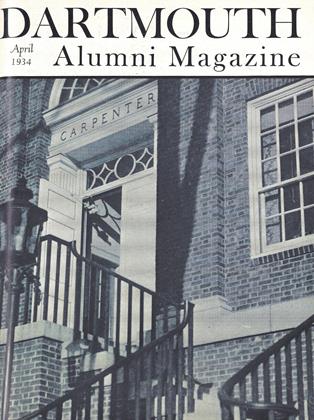It is PERHAPS significant that undergraduate journalistic lore decrees that the editor of The Dartmouth must retire from his one year incumbency a disillusioned cynic. He is overcome by a sense of futility in trying to guide his paper in such a way that it will live up to the expectations of some twenty-five hundred readers of varied tastes. This is the theory and the truth is not far off.
The campus at large looks for certain specific qualities in an undergraduate paper and its insistence that these should exist creates a constant force of criticism of higher voltage than for any non-collegiate newspaper. Let us examine these criteria for a successful journal.
A paper must be accurate; it must be attractively made-up; it must "run" a plentiful assortment of well-written news stories. To supplement the occasional lack of color in the news columns there must be features and innovations, So far these qualifications are almost identical with those of metropolitan "sheets." But to these we must add more.
The Dartmouth must have a well-proportioned ratio between athletic and aesthetic events; it must carry matter of interest to the unusually critical trained mind of the professor as well as of interest to the uninitiated freshman. Through its editorial columns it is expected to be a leader of campus activity, surpassing Palaeopitus and Green Key in its zeal for reform, in its initiative—this in addition to being intellectually stimulating.
This work must be done by sophomores and juniors whose qualifications and mentality are not a great deal superior to those of the average undergraduate.
Some day a Utopia may be reached whereby seniors will be willing to relieve lower classmen of their editorial burdens, but this time will not come until the senior is willing to give up the all too precious leisure and freedom of his last few months in college. Failing the Utopia there can be only a plea for tolerance, for a more intelligent criticism, and an understanding of the complexity of the problems facing any undergraduate paper.
This editorial is a plea for tolerance and understanding.
While The Dartmouth is fortunately not censored by the College authorities there is the constant problem of giving offense through editorial comment, for Hanover is a small community, hi addition much fine editorial fodder is withheld for purposes of cooperation with various organizations involved until the belated point is reached when the paper merely can approve action taken. In a college in which many forces are at work there is much that is best kept sub rosa. But failing to appreciate this, the various forces of criticism, frequently at variance with each other keep on battering until the weary editors succumb to a fresh group of idealists and the process is repeated.
This editorial, written by a former officer of the paper may veer too much towards defeatism, may seem too much of an alibi. What is the solution then to reoccurring editorial calamities?
The answer lies in part in restoring the true leadership of the college where it justly belongs—to Palaeopitus and Green Key, thus allowing the newspaper to lay greater stress on fulfilling its purely journalistic functions, thus relieving the insistency of the demand that The Dartmouth "do something"; a demand which should really be directed elsewhere. In part the answer lies in a more helpful, less critical, more understanding point of view on the part of the faculty, whose frequently ill-founded comments are a constant source of unfavorable propaganda. Finally, the attitude of the undergraduate might be constructive as well as critical. Criticism in itself is not to be scorned. It is a valuable stimulant if applied moderately and intelligently. But where criticism succumbs to a blind prejudice or an unthinking glibness only confusion and defeat result.
Editor, The Dartmouth
 View Full Issue
View Full Issue
More From This Issue
-
 Class Notes
Class NotesClass of 1918
April 1934 By Allan C. Gottschaldt -
 Article
ArticleHANOVER BROWSING
April 1934 By Rees H. Bowen -
 Class Notes
Class NotesClass of 1910
April 1934 By Harold P. Hinman -
 Class Notes
Class NotesClass of 1908
April 1934 By Laurence W. Griswold -
 Class Notes
Class NotesClass of 1930
April 1934 By Albert I. Dickerson -
 Class Notes
Class NotesClass of 1923
April 1934 By John C. Allen
Article
-
 Article
ArticleCLASS OF '94 LEADS IN FRESHMAN SONS
January 1920 -
 Article
ArticlePresident Ernest Martin Hopkins In The Dartmouth
NOVEMBER, 1926 -
 Article
ArticleLondon Trip a Sellout
APRIL 1973 -
 Article
ArticleMasthead
Nov/Dec 2010 -
 Article
ArticleCreative Housing Option
NOVEMBER 1999 By Meeta Agrawal '01 -
 Article
ArticleHANOVER BROWSING
By Rees H. Bowen


